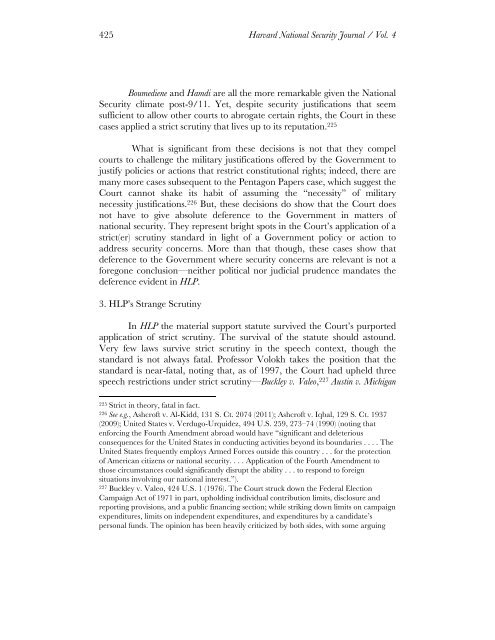Vo.4-Moshirnia-Final
Vo.4-Moshirnia-Final
Vo.4-Moshirnia-Final
You also want an ePaper? Increase the reach of your titles
YUMPU automatically turns print PDFs into web optimized ePapers that Google loves.
425 Harvard National Security Journal / Vol. 4<br />
Boumediene and Hamdi are all the more remarkable given the National<br />
Security climate post-9/11. Yet, despite security justifications that seem<br />
sufficient to allow other courts to abrogate certain rights, the Court in these<br />
cases applied a strict scrutiny that lives up to its reputation. 225<br />
What is significant from these decisions is not that they compel<br />
courts to challenge the military justifications offered by the Government to<br />
justify policies or actions that restrict constitutional rights; indeed, there are<br />
many more cases subsequent to the Pentagon Papers case, which suggest the<br />
Court cannot shake its habit of assuming the “necessity” of military<br />
necessity justifications. 226 But, these decisions do show that the Court does<br />
not have to give absolute deference to the Government in matters of<br />
national security. They represent bright spots in the Court’s application of a<br />
strict(er) scrutiny standard in light of a Government policy or action to<br />
address security concerns. More than that though, these cases show that<br />
deference to the Government where security concerns are relevant is not a<br />
foregone conclusion—neither political nor judicial prudence mandates the<br />
deference evident in HLP.<br />
3. HLP’s Strange Scrutiny<br />
In HLP the material support statute survived the Court’s purported<br />
application of strict scrutiny. The survival of the statute should astound.<br />
Very few laws survive strict scrutiny in the speech context, though the<br />
standard is not always fatal. Professor Volokh takes the position that the<br />
standard is near-fatal, noting that, as of 1997, the Court had upheld three<br />
speech restrictions under strict scrutiny—Buckley v. Valeo, 227 Austin v. Michigan<br />
225 Strict in theory, fatal in fact.<br />
226 See e.g., Ashcroft v. Al-Kidd, 131 S. Ct. 2074 (2011); Ashcroft v. Iqbal, 129 S. Ct. 1937<br />
(2009); United States v. Verdugo-Urquidez, 494 U.S. 259, 273–74 (1990) (noting that<br />
enforcing the Fourth Amendment abroad would have “significant and deleterious<br />
consequences for the United States in conducting activities beyond its boundaries . . . . The<br />
United States frequently employs Armed Forces outside this country . . . for the protection<br />
of American citizens or national security. . . . Application of the Fourth Amendment to<br />
those circumstances could significantly disrupt the ability . . . to respond to foreign<br />
situations involving our national interest.”).<br />
227 Buckley v. Valeo, 424 U.S. 1 (1976). The Court struck down the Federal Election<br />
Campaign Act of 1971 in part, upholding individual contribution limits, disclosure and<br />
reporting provisions, and a public financing section; while striking down limits on campaign<br />
expenditures, limits on independent expenditures, and expenditures by a candidate’s<br />
personal funds. The opinion has been heavily criticized by both sides, with some arguing
















